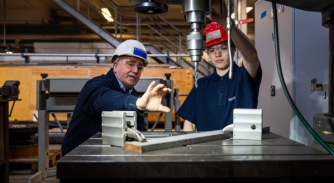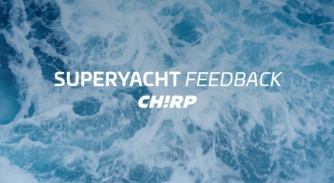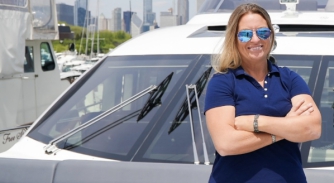It can be lonely up there ... Being a superyacht captain
PYA CEO Christophe Bourillon looks at the role of the captain, from navigating challenges to enhancing excellence.…
The life of a superyacht captain is a unique blend of adventure, responsibility and continuous learning. It’s a tough job, but it can be extremely rewarding. It demands a high level of expertise, leadership and adaptability to various challenges. Among these are issues like recruiting and retaining high-quality staff, maintaining the well-being of the crew and the ongoing need for self-development, as well as topical issues such as the recent prevalence of fake licences.
Recruiting and retaining good crew
Finding and keeping talented crewmembers is a significant challenge. The yachting industry is highly competitive, and there is a constant demand for skilled professionals. Captains need to implement effective recruitment strategies and create a work environment that encourages retention.
Offering a respectful and inclusive workplace and opportunities for career advancement, as well as competitive salaries and benefits, are essential strategies. The PYA supports captains in these efforts by providing one-to-one advice on career routes, as well as assistance and support to crewmembers, helping to set up Yacht Crew Help, a dedicated 24/7 helpline. We also communicate outside our industry on the reality of working on a superyacht, with the aim of attracting talents to the yachting sector who would not necessarily consider a career with us.
Well-being at sea
Without crew there is no boat. The well-being of the crew is paramount in ensuring the smooth operation of a superyacht. The nature of the job can be demanding, with long hours and extended periods away from home. This can lead to physical and mental fatigue which, if not addressed, can affect performance, morale and good teamwork.
Captains play a crucial role in fostering a supportive environment by encouraging open communication and providing opportunities for relaxation and recreation. Ensuring the well-being of the crew not only enhances their performance, but also contributes to a positive and productive work environment. However, captains are under tremendous pressure, and it’s important that they also look after their own well-being – be it physical or mental.

Effective leadership involves leading by example, providing constructive feedback and
recognising the achievements of the crew. By cultivating these qualities, captains can inspire
their teams and drive the industry forward.
Continuous learning and self-development
Continuous learning and self-development are critical for both personal and professional growth in the yachting industry. Regular training enhances the quality of service provided on board and keeps the crew motivated and engaged. If time can be found in the crew’s busy schedules, on-board training can be extremely beneficial in many ways – by enhancing skills and also in developing crew cohesion.
Captains who prioritise continuous learning set a positive example for their crew, fostering a culture of excellence and innovation.
Mentorship and leadership
The need for strong mentorship and leadership within the yachting industry cannot be overstated. Captains and heads of department are in unique positions to motivate and guide their teams.
Mentorship programmes that pair experienced professionals with newer crewmembers not only help in skill development, but also in building confidence and fostering a sense of belonging. Effective leadership involves leading by example, providing constructive feedback and recognising the achievements of the crew. By cultivating these qualities, captains can inspire their teams and drive the industry forward.
The issue of fake licences
One of the pressing concerns we’ve seen arising recently is the prevalence of fake licences. With growing demand for qualified crewmembers, there has been an increase in fraudulent certifications. This poses significant risks to both the safety of the yacht and to the reputation of the yachting industry.
Captains need to be extremely diligent when hiring new crewmembers. This involves thorough background checks and verification of credentials through reliable sources. The PYA provides resources and support to ensure that captains can identify and avoid fraudulent certificates. By collaborating with flag administrations and recognised maritime institutions, we help maintain the integrity and safety standards of the industry.
Looking to the future
The increasing negative public perception of superyachts means we’re engaging in a growing number of activities to tell the world about the reality of yachting – in particular, through interaction with mainstream journalists in print, radio and TV.
The yachting industry is growing, and with more and more vessels being built, we’re also seeing different types of yachts, such as explorer yachts and hybrid vessels, doing humanitarian work. There are great opportunities out there for qualified individuals … but without crew, there are no yachts.
Profile links
Professional Yachting Association
NEW: Sign up for SuperyachtNewsweek!
Get the latest weekly news, in-depth reports, intelligence, and strategic insights, delivered directly from The Superyacht Group's editors and market analysts.
Stay at the forefront of the superyacht industry with SuperyachtNewsweek
Click here to become part of The Superyacht Group community, and join us in our mission to make this industry accessible to all, and prosperous for the long-term. We are offering access to the superyacht industry’s most comprehensive and longstanding archive of business-critical information, as well as a comprehensive, real-time superyacht fleet database, for just £10 per month, because we are One Industry with One Mission. Sign up here.
Related news

Building the next generation
Pendennis has been running an apprenticeship scheme for over 25 years, forming the bedrock of its experienced team of employees
Crew

ISWAN begin new research project
Crew will take part in innovative on-board research using wearable and mobile technology to track the impact of social interaction on their well-being
Crew
.jpg)
The Superyacht Report - Captains Focus: Read It Now!
Issue 221: The Superyacht Report - Captains Focus is now available to read and download online
Crew

CHIRP Report: Lack of crew in an emergency
This crew’s skilful averting of a grounding demonstrates their competence and good seamanship, but also a severe deficiency of preparedness
Crew

A sobering reality
As the industry looks to become more professionalised, Captain Kelly Gordon explains how dry boats can help solve the industry's drinking problem
Opinion
Related news
Building the next generation
9 months ago
ISWAN begin new research project
10 months ago
The Superyacht Report - Captains Focus: Read It Now!
10 months ago
CHIRP Report: Lack of crew in an emergency
10 months ago
A sobering reality
11 months ago
NEW: Sign up for
SuperyachtNewsweek!
Get the latest weekly news, in-depth reports, intelligence, and strategic insights, delivered directly from The Superyacht Group's editors and market analysts.
Stay at the forefront of the superyacht industry with SuperyachtNewsweek



